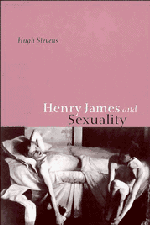Book contents
- Frontmatter
- Contents
- Preface
- Acknowledgements
- List of abbreviations
- 1 Henry James and the languages of sex
- 2 Gender and representation in The Wings of the Dove
- 3 Sexuality and the aesthetic in The Golden Bowl
- 4 The eroticism of prohibition: masochism and the law in Roderick Hudson
- 5 Queer plotting: The Bostonians and The Princess Casamassima
- 6 James's late short fiction and the spectacle of modern homosexuality
- 7 Suicide and blackmail: James's ‘poor sensitive gentlemen’
- Conclusion: ‘that queer monster the artist’
- Notes
- Bibliography
- Index
3 - Sexuality and the aesthetic in The Golden Bowl
Published online by Cambridge University Press: 28 October 2009
- Frontmatter
- Contents
- Preface
- Acknowledgements
- List of abbreviations
- 1 Henry James and the languages of sex
- 2 Gender and representation in The Wings of the Dove
- 3 Sexuality and the aesthetic in The Golden Bowl
- 4 The eroticism of prohibition: masochism and the law in Roderick Hudson
- 5 Queer plotting: The Bostonians and The Princess Casamassima
- 6 James's late short fiction and the spectacle of modern homosexuality
- 7 Suicide and blackmail: James's ‘poor sensitive gentlemen’
- Conclusion: ‘that queer monster the artist’
- Notes
- Bibliography
- Index
Summary
‘Is there a mode of civilized discourse which might at least partially dissipate our savage sexuality?’
Leo Bersani, The Freudian BodyIn the prefaces James seems to waver between two notions of what would constitute the ‘ideal’ novel: the self-contained organic whole and the referential narrative. This hesitation between two different ideals leads him to a dilemma, as he discerns a disjunction between the novel's aspirations to ‘beauty’ and its obligation to ‘truth’. In The Golden Bowl and The Wings of the Dove dramatic tension arises from this disjunction. The Golden Bowl is a narrative which seems to portray – in a parthenogenetic mise en abîme – itself being created. It begins by postulating the idea of the artwork as civilized form, and in a seemingly natural juxtaposition locates civilized form in the institution of marriage. The civilized discourse which is marriage is constituted in the repudiation of ‘our savage sexuality’. Yet sexuality in the novel is that which cannot be figured, that which is always alluded to but rarely directly portrayed. The novel returns again and again to the question of the marriage, which survives through the renunciation of incest and the denial of adultery. Ubiquitous desire is replaced by an insistence that sexual desire can be channelled solely through the marital bond.
Marriage then, like the poem in New Criticism, or the organic whole of the Romantics, is a form resolving all conflicts of its disparate parts.
- Type
- Chapter
- Information
- Henry James and Sexuality , pp. 45 - 60Publisher: Cambridge University PressPrint publication year: 1998



